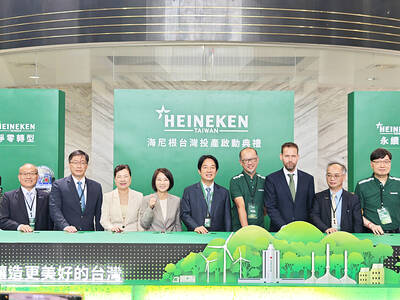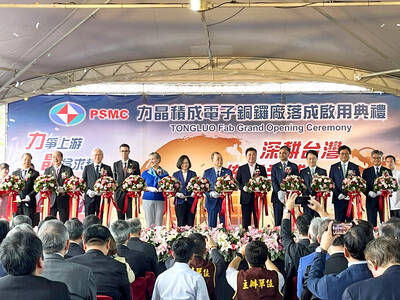Once the most famous sightseeing spot in Taiwan, the observatory on top of the nation's third highest building, the Shin Kong Tower, will close down at the end of the year after posting losses over the past two years, a company official said yesterday.
The 12-year lease contract for the observatory, located on the 46th floor, or 200m up in the tower opposite the Taipei Main Station, will expire on Dec. 31.
Wu Chuan-chuan (吳娟娟), general manager of the Shin Kong Observatory, said the business started getting in the red two years ago and has posted losses of NT$6 million (US$179,100) this year alone.
"It's the best sightseeing spot. Perhaps people have forgotten about it, and perhaps we haven't done enough marketing and advertising," Wu said.
Opened in 1994, the observatory once drew over 6,000 people a day at its peak, but traffic has drastically declined to only 100 tourists on weekdays or more than 200 on weekends.
Shin Kong Tower's halo has been snatched by the much higher Taipei 101 Observatory, located on the 89th floor of the Taipei 101 building at a height of 382.2m.
Taipei 101 has become the new favorite with traffic surging to 5,000 to 8,000 people on holidays, said Michael Liu (劉家豪), assistant vice president of Taipei Financial Center Corp (台北金融大樓公司), manager of the skyscraper.

purpose: Tesla’s CEO sought to meet senior Chinese officials to discuss the rollout of its ‘full self-driving’ software in China and approval to transfer data they had collected Tesla Inc CEO Elon Musk arrived in Beijing yesterday on an unannounced visit, where he is expected to meet senior officials to discuss the rollout of "full self-driving" (FSD) software and permission to transfer data overseas, according to a person with knowledge of the matter. Chinese state media reported that he met Premier Li Qiang (李強) in Beijing, during which Li told Musk that Tesla's development in China could be regarded as a successful example of US-China economic and trade cooperation. Musk confirmed his meeting with the premier yesterday with a post on social media platform X. "Honored to meet with Premier Li

Dutch brewing company Heineken NV on Friday announced an investment of NT$13.5 billion (US$414.62 million) over the next five years in Taiwan. The first multinational brewing company to operate in Taiwan, Heineken made the statement at a ceremony held at its brewery in Pingtung County. It also outlined its efforts to make the brewery “net zero” by 2030. Heineken has been in the Taiwanese market for 20 years, Heineken Taiwan managing director Jeff Wu (吳建甫) said. With strong support from local consumers, the Dutch brewery decided to transition from sales to manufacturing in the country, Wu said. Heineken assumed majority ownership and management rights

ARTIFICIAL INTELLIGENCE: The chipmaker last month raised its capital spending by 28 percent for this year to NT$32 billion from a previous estimate of NT$25 billion Contract chipmaker Powerchip Semiconductor Manufacturing Corp (力積電子) yesterday launched a new 12-inch fab, tapping into advanced chip-on-wafer-on-substrate (CoWoS) packaging technology to support rising demand for artificial intelligence (AI) devices. Powerchip is to offer interposers, one of three parts in CoWoS packaging technology, with shipments scheduled for the second half of this year, Powerchip chairman Frank Huang (黃崇仁) told reporters on the sidelines of a fab inauguration ceremony in the Tongluo Science Park (銅鑼科學園區) in Miaoli County yesterday. “We are working with customers to supply CoWoS-related business, utilizing part of this new fab’s capacity,” Huang said, adding that Powerchip intended to bridge

Microsoft Corp yesterday said that it would create Thailand’s first data center region to boost cloud and artificial intelligence (AI) infrastructure, promising AI training to more than 100,000 people to develop tech. Bangkok is a key economic player in Southeast Asia, but it has lagged behind Indonesia and Singapore when it comes to the tech industry. Thailand has an “incredible opportunity to build a digital-first, AI-powered future,” Microsoft chairman and chief executive officer Satya Nadella said at an event in Bangkok. Data center regions are physical locations that store computing infrastructure, allowing secure and reliable access to cloud platforms. The global embrace of AI